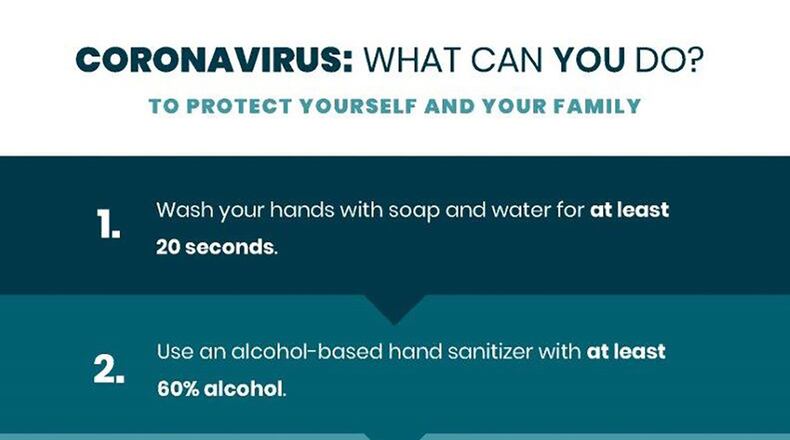There are simple everyday preventive actions to help prevent the spread of all respiratory viruses. These include avoiding close contact with people who are sick. Avoid touching your eyes, nose and mouth with unwashed hands. Wash your hands often with soap and water for at least 20 seconds. Use an alcohol-based hand sanitizer that contains at least 60% alcohol if soap and water are not available.
The Wright-Patterson Medical Center public health team and infectious disease physicians are also meeting daily to review guidance and information from local, state, federal, international, Air Force, Defense Health Agency and Department of Defense organizations related to COVID-19.
For general COVID-19 questions, the Ohio Department of Health has set up a COVID-19 hotline to answer questions and can be reach at 1-833-427-5634. It is also recommended that you visit the CDC website for national updates: https://www.cdc.gov/coronavirus/2019-ncov/
For those beneficiaries of the 88th Medical Group who have specific questions or concerns, please call the WPMC appointment line at 937-522-2778 during duty hours and the TRICARE Nurse Advice line: 1-800-874-2273 outside of normal duty hours.
If an 88th Medical Group beneficiary is exhibiting symptoms and is identified as being at risk for COVID-19, then the patient should present at the WPMC Emergency Room. When possible, the emergency department should be notified before arrival to make sure the patient can be triaged and cared for as quickly as possible. Upon arrival, the patient will be instructed to wear a surgical mask and evaluated with proper personal protective equipment and precautions (standard, contact, airborne, and eye protection) by the WPMC care team.
Below are frequently asked questions and answers related to COVID-19 from the Centers for Disease Control and Prevention:
Coronavirus Q & A
What is coronavirus disease 2019 (COVID-19)?
Coronavirus disease 2019 (COVID-19) is a respiratory illness that can spread from person to person. The virus that causes COVID-19 is a novel (new) coronavirus that was first identified during an investigation into an outbreak in Wuhan, China. The virus has been named “SARS-CoV-2,” and the disease it causes has been named “coronavirus disease 2019” (abbreviated “COVID-19”).
What are the symptoms of COVID-19?
Patients with COVID-19 have had mild to severe respiratory illness with symptoms of – fever, cough and shortness of breath
Reported illnesses have ranged from very mild (including some with no reported symptoms) to severe, including illness resulting in death. Older people and people of all ages with severe underlying health conditions – like heart disease, lung disease and diabetes, for example – at higher risk of developing serious COVID-19 illness.
How can I help protect myself?
The best way to prevent infection is to avoid being exposed to the virus that causes COVID-19.
There are simple everyday preventive actions to help prevent the spread of respiratory viruses. These include:
Avoid close contact with people who are sick.
Avoid touching your eyes, nose, and mouth with unwashed hands.
Wash your hands often with soap and water for at least 20 seconds. Use an alcohol-based hand sanitizer that contains at least 60% alcohol if soap and water are not available.
If you are sick, to keep from spreading respiratory illness to others, you should:
Stay home when you are sick.
Cover your cough or sneeze with a tissue, then throw the tissue in the trash.
Clean and disinfect frequently touched objects and surfaces.
Is there a vaccine?
There is currently no vaccine to protect against COVID-19. The best way to prevent infection is to avoid being exposed to the virus that causes COVID-19.
Is there a treatment?
There is no specific antiviral treatment for COVID-19. People with COVID-19 can seek medical care to help relieve the severity of symptoms.
About the Author
